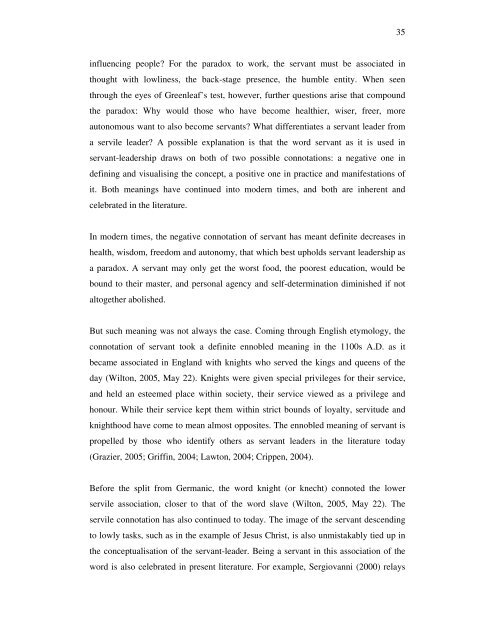nurturing servant leaders in religious education - Scholarly ...
nurturing servant leaders in religious education - Scholarly ...
nurturing servant leaders in religious education - Scholarly ...
You also want an ePaper? Increase the reach of your titles
YUMPU automatically turns print PDFs into web optimized ePapers that Google loves.
<strong>in</strong>fluenc<strong>in</strong>g people? For the paradox to work, the <strong>servant</strong> must be associated <strong>in</strong><br />
thought with lowl<strong>in</strong>ess, the back-stage presence, the humble entity. When seen<br />
through the eyes of Greenleaf’s test, however, further questions arise that compound<br />
the paradox: Why would those who have become healthier, wiser, freer, more<br />
autonomous want to also become <strong>servant</strong>s? What differentiates a <strong>servant</strong> leader from<br />
a servile leader? A possible explanation is that the word <strong>servant</strong> as it is used <strong>in</strong><br />
<strong>servant</strong>-<strong>leaders</strong>hip draws on both of two possible connotations: a negative one <strong>in</strong><br />
def<strong>in</strong><strong>in</strong>g and visualis<strong>in</strong>g the concept, a positive one <strong>in</strong> practice and manifestations of<br />
it. Both mean<strong>in</strong>gs have cont<strong>in</strong>ued <strong>in</strong>to modern times, and both are <strong>in</strong>herent and<br />
celebrated <strong>in</strong> the literature.<br />
In modern times, the negative connotation of <strong>servant</strong> has meant def<strong>in</strong>ite decreases <strong>in</strong><br />
health, wisdom, freedom and autonomy, that which best upholds <strong>servant</strong> <strong>leaders</strong>hip as<br />
a paradox. A <strong>servant</strong> may only get the worst food, the poorest <strong>education</strong>, would be<br />
bound to their master, and personal agency and self-determ<strong>in</strong>ation dim<strong>in</strong>ished if not<br />
altogether abolished.<br />
But such mean<strong>in</strong>g was not always the case. Com<strong>in</strong>g through English etymology, the<br />
connotation of <strong>servant</strong> took a def<strong>in</strong>ite ennobled mean<strong>in</strong>g <strong>in</strong> the 1100s A.D. as it<br />
became associated <strong>in</strong> England with knights who served the k<strong>in</strong>gs and queens of the<br />
day (Wilton, 2005, May 22). Knights were given special privileges for their service,<br />
and held an esteemed place with<strong>in</strong> society, their service viewed as a privilege and<br />
honour. While their service kept them with<strong>in</strong> strict bounds of loyalty, servitude and<br />
knighthood have come to mean almost opposites. The ennobled mean<strong>in</strong>g of <strong>servant</strong> is<br />
propelled by those who identify others as <strong>servant</strong> <strong>leaders</strong> <strong>in</strong> the literature today<br />
(Grazier, 2005; Griff<strong>in</strong>, 2004; Lawton, 2004; Crippen, 2004).<br />
Before the split from Germanic, the word knight (or knecht) connoted the lower<br />
servile association, closer to that of the word slave (Wilton, 2005, May 22). The<br />
servile connotation has also cont<strong>in</strong>ued to today. The image of the <strong>servant</strong> descend<strong>in</strong>g<br />
to lowly tasks, such as <strong>in</strong> the example of Jesus Christ, is also unmistakably tied up <strong>in</strong><br />
the conceptualisation of the <strong>servant</strong>-leader. Be<strong>in</strong>g a <strong>servant</strong> <strong>in</strong> this association of the<br />
word is also celebrated <strong>in</strong> present literature. For example, Sergiovanni (2000) relays<br />
35

















